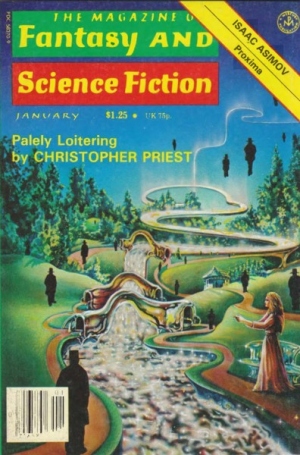The Golden Age of Science Fiction: “Palely Loitering,” by Christopher Priest

Peter Graham is often quoted as saying that the Golden Age of Science Fiction is 12. I was reminded of this quote last year while reading Jo Walton’s An Informal History of the Hugo Awards (Tor Books) when Rich Horton commented that based on Graham’s statement, for him, the Golden Age of Science Fiction was 1972. It got me thinking about what science fiction (and fantasy) looked like the year I turned twelve and so this year, I’ll be looking at the year 1979 through a lens of the works and people who won science fiction awards in 1980, ostensibly for works that were published in 1979. I’ve also invited Rich to join me on the journey and he’ll be posting articles looking at the 1973 award year.
The British Science Fiction Association (BSFA) Awards have been presented by the British Science Fiction Association since 1970 and were originally nominated for and voted on by the members of the Association. The Short Fiction (later Short Story) award was created in 1980, and Christopher Priest’s “Palely Loitering” won the award in its first year. The award was presented every year until 2017, when it was won by Jaine Fenn for “Liberty Bird.” In 2018, it was replaced with an award for Shorter Fiction.
Originally published by Edward L. Ferman in the January 1979 issue of The Magazine of Fantasy and Science Fiction, “Palely Loitering” is a time travel story set in a future England that has the feel of a story set in an England of the 1920s. Mykle comes from a wealthy family who goes on an annual picnic to a park where they can cross bridges into either the future or the past. When Mykle leaps from one of the bridges, he finds himself much further in the future than anticipated and can only get home with the help of a stranger, who also points out a beautiful woman, Estyll, who will become a focus for Mykle, who often returns to the park and that future to find her.
“Palely Loitering” is reminiscent of Richard Matheson’s Bid Time Return (filmed as Somewhere in Time) and the film Citizen Kane. The former also deals with a man who travels through time to meet a woman he has become obsessed with. For Richard Collier in Matheson’s novel, it is actress Elise McKenna. For Mykle in Priest’s story, it is the enigmatic Estyll.